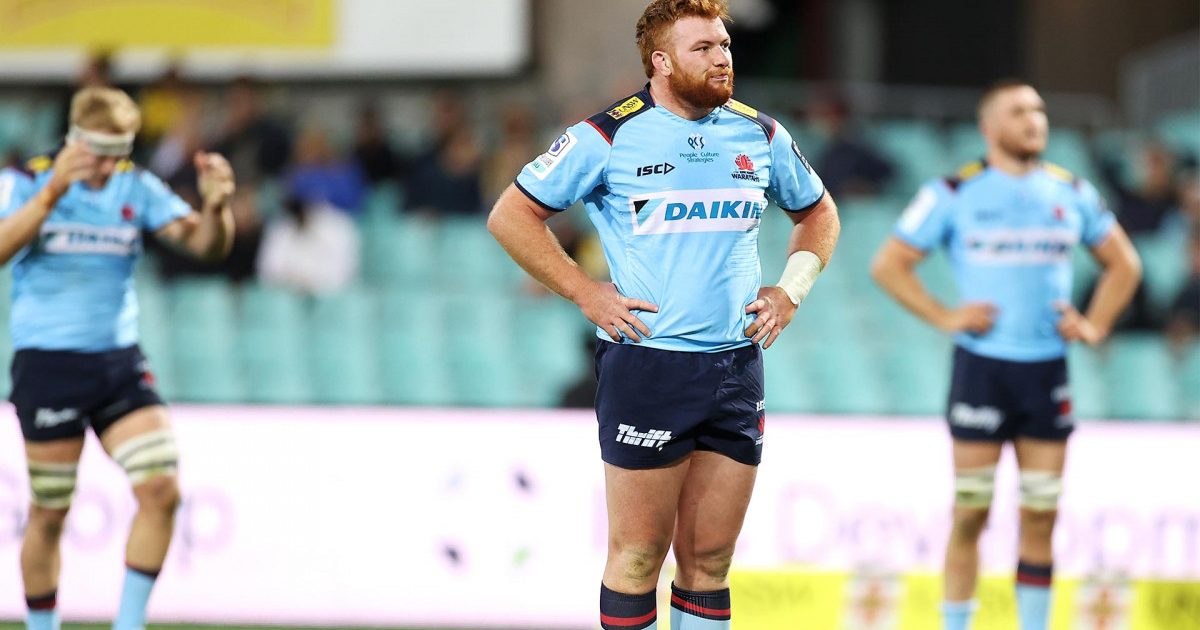Why the Waratahs aren't as bad as their record defeat against the Hurricanes suggests

Former Blues captain James Parsons believes the Waratahs aren’t as bad as their results this season suggests, despite calls from within the New South Wales franchise for significant changes.
Waratahs interim co-coach Chris Whitaker called for a cultural overhaul in the wake of his side’s record 64-48 thumping at the hands of the Hurricanes in Sydney last Friday.
The result was the side’s ninth straight defeat as they continue to search for their first win in a disastrous 2021 campaign that saw Rob Penney axed from the head coach role in March.
Whitaker has since joined Jason Gilmore in stepping up from their assistant roles to take over as interim co-coaches, but the ex-Wallabies halfback a significant shift in mindset is required to save the fledgling club.
“There were just too many soft tries. It’s just not acceptable. There were three or four tries where individuals need to put their hand up and say that’s not good enough,” the 46-year-old said shortly after Friday’s loss.
“The sad thing is there was some good footy out there. Both sides played some good footy and unfortunately the fact that they scored 60-odd points is going to overshadow that we scored 48.”
He added that the hunger for attacking rugby within the Sydney rugby scene over the last two decades has resulted in the neglect of defensive responsibilities.
“Because we’re an attacking team, defence has been on the back burner for so long,” Whitaker said. “In the Sydney market, everyone wants to see attacking rugby but I think the mindset needs to change.
“If you look at teams around the world who win competitions, it’s on the back of their defence.”
However, speaking on the Aotearoa Rugby Pod, Parsons was optimistic about the Waratahs’ chances of defensive improvement as he attributed their heavy defeat to a lack of exposure against New Zealand opposition.
Last weekend’s match was the first time the Waratahs played a Kiwi side since last March, when they suffered a hefty defeat to the Chiefs in Wollongong during the pre-COVID Super Rugby season.
Between last July and April, the Waratahs had only played Australian opposition across two seasons of Super Rugby AU before they opened their Super Rugby Trans-Tasman campaign against the Hurricanes.
The Waratahs aren’t ruling out sending an SOS for Wallabies captain Michael Hooper as they look to resuscitate their Super Rugby Trans-Tasman campaign. #SuperRugbyTT https://t.co/qA5WdYKZHx
— RugbyPass (@RugbyPass) May 17, 2021
While Parsons conceded that the New South Welshmen can’t afford to concede as many points as they did at the Sydney Cricket Ground, the two-test All Black said they will improve as they become more accustomed to their new opponents.
“What they’re trying to do, I suppose, is send a message to the fans that they understand it’s not looking right and they’re trying to put things in place to get a change,” Parsons told the Aotearoa Rugby Pod of Whitaker’s comments.
“It’s not ideal to the players, but the players also understand the scoreline is not ideal as well.
“At the end of the day, we are in a results-based business, so you do have to shore up and can’t allow that many points, but I think it will tighten up.”
Parsons used an example from last Friday’s match as an example of how the Waratahs can build their defence against the New Zealand sides by pointing to Peter Umaga-Jensen’s try in the 61st minute.
The try came off a simple set move near the halfway line, where fullback Jordie Barrett sat in behind a three-man pod comprised of James Blackwell on the short side, Isaia Walker-Leawere in the middle, and Du’Plessis Kirifi on the far side.
First-five Orbyn Leger passed the ball to Walker-Leawere, labelled by Parsons as the “forward runner” of the pod, who took the ball to the line.
With Kirifi – the “tip runner”, according to Parsons – standing outside of Walker-Leawere, the Waratahs had two defenders marking both the forward runner and the tip runner as they expected either the lock or flanker to carry the ball into contact.
Week one was a 0-5 whitewash for Australian sides, but the Brumbies and Western Force look well-placed to ruffle some feathers during the remainder of Super Rugby Trans-Tasman. #SuperRugbyTT https://t.co/oMT7VaHzGd
— RugbyPass (@RugbyPass) May 17, 2021
What they didn’t see coming, though, was Barrett, who had moved from directly behind the pod to run a line in between Walker-Leawere and Kirifi, acting as a short ball option.
Without having anticipated Barrett’s run, the Waratahs left a gaping hole for the All Blacks star to run through as their only two defenders in the line had already committed themselves to Walker-Leawere and Kirifi.
Walker-Leawere recognised this as he popped the short ball to Barrett, who cantered through the defensive line for a clean break before spreading the ball to the supporting Kirifi, who drew in the covering defence to set Umaga-Jensen up for an easy try.
Parsons said that after two seasons of New Zealand teams playing each other in Super Rugby Aotearoa, Kiwi sides well aware of the threat Barrett poses as a strike weapon with ball in hand.
He suggested the same can’t be said of the Waratahs, who Barrett last played against in round one of 2019 Super Rugby season.
“We’re so used to seeing that as Kiwis and we always mark Jordie to close up that space,” Parsons said.
“The Waratahs didn’t and he busts through and he links with Umaga-Jensen and Umaga-Jensen scores. They’ll get used to these nuances that the Kiwi teams try to play.”
The Waratahs continue their Super Rugby Trans-Tasman season this Saturday when they face off against the Blues at Eden Park in Auckland.
Listen to the latest episode of the Aotearoa Rugby Pod:

























































